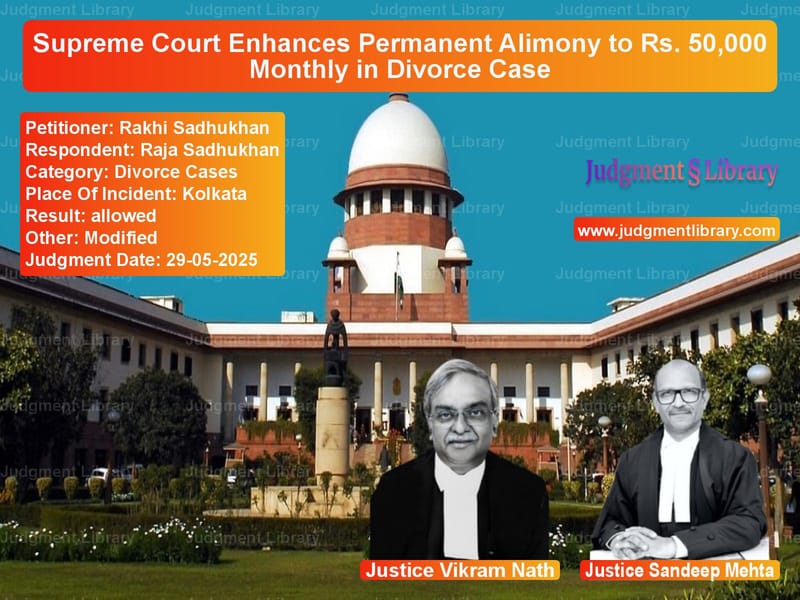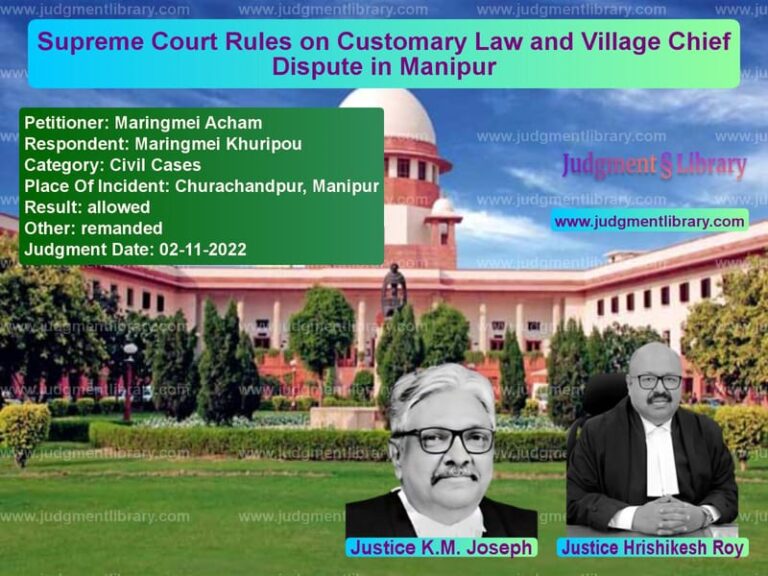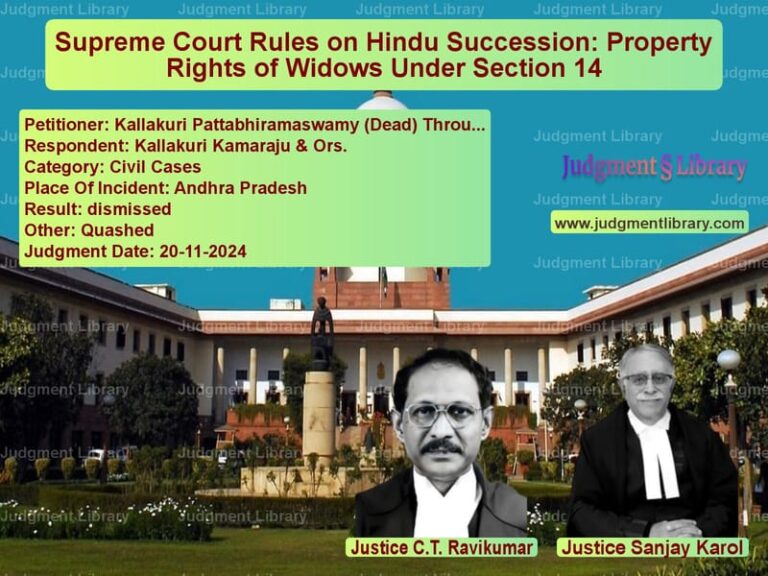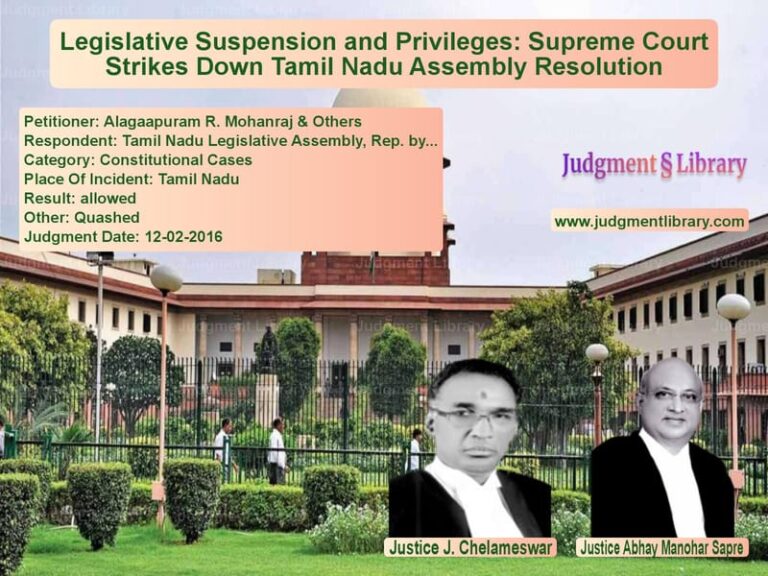Supreme Court Enhances Permanent Alimony to Rs. 50,000 Monthly in Divorce Case
The Supreme Court of India recently delivered a significant judgment that underscores the importance of ensuring financial security for women after divorce. The case between Rakhi Sadhukhan and Raja Sadhukhan revolved around the adequacy of permanent alimony awarded to the appellant-wife, who had been granted a monthly maintenance of Rs. 20,000 by the High Court. The apex court, after careful consideration of the facts and circumstances, enhanced the amount to Rs. 50,000 per month, emphasizing the need for maintenance that reflects the standard of living during the marriage and accounts for inflationary pressures.
The journey of this legal battle began many years ago, with the couple marrying in 1997 and having a son in 1998. However, their marital relationship deteriorated over time, leading the husband to file for divorce in 2008 on grounds of cruelty. The wife, in response, sought interim maintenance for herself and their minor son. The Trial Court initially dismissed the divorce petition, but the High Court later allowed the husband’s appeal, granting a decree of divorce on the grounds of mental cruelty and irretrievable breakdown of marriage. While the High Court awarded permanent alimony of Rs. 20,000 per month to the wife, she found this amount insufficient and approached the Supreme Court for enhancement.
The Supreme Court’s intervention in this matter highlights the evolving jurisprudence on spousal maintenance in India. The court recognized that the amount fixed by the High Court was originally awarded as interim maintenance and needed revision to ensure the wife’s financial stability. The respondent-husband, who worked at the Institute of Hotel Management in Kolkata, disclosed a net monthly income of Rs. 1,64,039, along with previous employment at the Taj Hotel, where he earned a substantial annual salary. Despite his claims of financial constraints due to remarriage and dependent family members, the court found him capable of paying a higher alimony amount.
In its ruling, the Supreme Court emphasized that the appellant-wife, who remained unmarried and lived independently, was entitled to maintenance that aligned with the standard of living she enjoyed during the marriage. The court also considered the inflationary cost of living and her reliance on maintenance as her sole source of financial support. The judgment reflects a balanced approach, ensuring that the wife’s dignity and financial needs are upheld while acknowledging the husband’s obligations.
Background of the Case
The appellant-wife and respondent-husband were married on June 18, 1997, and had a son on August 5, 1998. Their marriage, however, faced significant challenges, leading the husband to file for divorce in July 2008 under the Special Marriage Act, 1954, alleging cruelty by the wife. In response, the wife sought interim maintenance for herself and their minor son under the Hindu Marriage Act, 1955. The Trial Court, in its order dated January 14, 2010, awarded her Rs. 8,000 per month as interim maintenance and Rs. 10,000 for litigation expenses. Later, in 2010, she filed another application under Section 125 of the Code of Criminal Procedure, 1973, seeking maintenance. The Trial Court, in March 2014, directed the husband to pay Rs. 8,000 per month to the wife and Rs. 6,000 per month to the son, along with litigation costs.
The Trial Court dismissed the husband’s divorce petition in January 2016, stating that he had failed to prove cruelty. Dissatisfied, the husband appealed to the High Court of Calcutta. During the pendency of the appeal, the wife sought enhanced interim maintenance of Rs. 30,000 for herself and Rs. 20,000 for the son, along with litigation expenses. The High Court, in May 2015, directed the husband to pay Rs. 15,000 per month as interim maintenance, which was later enhanced to Rs. 20,000 in July 2016 after noting his net monthly salary of Rs. 69,000.
In its final order dated June 25, 2019, the High Court allowed the husband’s appeal, granting a decree of divorce on the grounds of mental cruelty and irretrievable breakdown of marriage. The court also directed the husband to redeem the mortgage on the flat where the wife resided and transfer the title deed to her name, allow her and their son to continue living in the flat, and pay permanent alimony of Rs. 20,000 per month, subject to a 5% increase every three years. Additionally, the husband was ordered to cover the son’s educational expenses and private tuition costs. The wife, aggrieved by the alimony amount, approached the Supreme Court.
Arguments of the Appellant-Wife
The appellant-wife contended that the amount of Rs. 20,000 per month, which the High Court made final, was originally awarded as interim maintenance. She argued that this sum was inadequate given the husband’s financial capacity and the standard of living they had enjoyed during their marriage. She submitted that the respondent-husband had a monthly income of approximately Rs. 4,00,000, making him capable of paying a higher alimony. Her legal team emphasized that the quantum of alimony should be commensurate with the husband’s income and the wife’s needs, especially since she had remained unmarried and relied solely on maintenance for her financial support.
One of the key points raised by the wife was the inflationary cost of living, which made it difficult for her to sustain herself on Rs. 20,000 per month. She also highlighted that the High Court’s award did not sufficiently account for the future financial security she deserved after years of marriage. Her arguments were grounded in the principle that maintenance should enable her to live a life of dignity, similar to what she had experienced during the marital relationship.
Arguments of the Respondent-Husband
The respondent-husband, in his defense, submitted that his current net monthly income was Rs. 1,64,039, earned from his employment at the Institute of Hotel Management in Kolkata. He provided salary slips, bank statements, and income tax returns for the year 2023–2024 as evidence. He also stated that he had previously worked at the Taj Hotel, where his gross annual salary was Rs. 21,92,525. The husband further claimed that his monthly household expenses amounted to Rs. 1,72,088, and he had financial responsibilities toward his new family, aged parents, and other dependents.
Another significant argument put forth by the husband was that their son, now 26 years old, was no longer financially dependent. He contended that this reduced his obligation to provide financial support. The husband also expressed his inability to pay a higher alimony amount, citing his current financial constraints and family commitments. His legal team urged the court to consider these factors while deciding on the enhancement of alimony.
Supreme Court’s Analysis and Key Arguments
The Supreme Court, after hearing both parties and examining the materials on record, delivered a reasoned judgment. The court noted that the High Court’s award of Rs. 20,000 per month as permanent alimony was inadequate and required revision. The judges emphasized that the respondent-husband’s income, financial disclosures, and past earnings established his capacity to pay a higher amount. The court also considered the appellant-wife’s situation, noting that she had remained unmarried and was living independently, relying entirely on maintenance for her financial needs.
One of the most important arguments made by the court was: “Having considered the submissions and materials on record, we are of the view that the quantum of permanent alimony fixed by the High Court requires revision. The respondent-husband’s income, financial disclosures, and past earnings establish that he is in a position to pay a higher amount. The appellant-wife, who has remained unmarried and is living independently, is entitled to a level of maintenance that is reflective of the standard of living she enjoyed during the marriage and which reasonably secures her future. Furthermore, the inflationary cost of living and her continued reliance on maintenance as the sole means of financial support necessitate a reassessment of the amount.”
The court further observed that the son, now an adult, was no longer entitled to mandatory financial support. However, it left open the possibility for the husband to voluntarily assist him with educational or other reasonable expenses. The court also clarified that the son’s right to inheritance remained unaffected and that any claims to ancestral or other property could be pursued in accordance with the law.
The Final Judgment
In its final ruling, the Supreme Court enhanced the permanent alimony to Rs. 50,000 per month, subject to a 5% increase every two years. The court stated: “In our considered opinion, a sum of Rs. 50,000/- per month would be just, fair and reasonable to ensure financial stability for the appellant-wife. This amount shall be subject to an enhancement of 5% every two years.” The court also disposed of the contempt petition filed by the wife and any pending applications.
This judgment sets a significant precedent in cases involving spousal maintenance, emphasizing the need for alimony to be realistic and reflective of the husband’s financial capacity and the wife’s needs. It also underscores the importance of considering inflationary trends and the standard of living during the marriage while determining maintenance.
Implications of the Judgment
The Supreme Court’s decision in Rakhi Sadhukhan vs. Raja Sadhukhan has far-reaching implications for divorce and maintenance cases in India. It reaffirms the principle that alimony should not be merely symbolic but should genuinely support the recipient’s financial needs. The judgment also highlights the court’s role in ensuring that maintenance awards are periodically reviewed to account for changing economic circumstances.
For women like Rakhi Sadhukhan, who rely on alimony as their primary source of income, this ruling provides a sense of financial security and dignity. It sends a clear message that the courts will intervene to correct inadequate maintenance awards and ensure that justice is served. The judgment also encourages husbands to be transparent about their financial status and fulfill their obligations toward their former spouses.
In conclusion, the Supreme Court’s judgment in this case is a step toward gender justice and financial equity in matrimonial disputes. It balances the rights and responsibilities of both parties while prioritizing the welfare of the financially dependent spouse. As the legal landscape continues to evolve, this ruling will likely serve as a benchmark for future cases involving permanent alimony and spousal maintenance.
Petitioner Name: Rakhi Sadhukhan.Respondent Name: Raja Sadhukhan.Judgment By: Justice Vikram Nath, Justice Sandeep Mehta.Place Of Incident: Kolkata.Judgment Date: 29-05-2025.Result: allowed.
Don’t miss out on the full details! Download the complete judgment in PDF format below and gain valuable insights instantly!
Download Judgment: rakhi-sadhukhan-vs-raja-sadhukhan-supreme-court-of-india-judgment-dated-29-05-2025.pdf
Directly Download Judgment: Directly download this Judgment
See all petitions in Alimony and Maintenance
See all petitions in Property Division in Divorce Cases
See all petitions in Divorce by Desertion
See all petitions in Other Cases
See all petitions in Judgment by Vikram Nath
See all petitions in Judgment by Sandeep Mehta
See all petitions in allowed
See all petitions in Modified
See all petitions in supreme court of India judgments May 2025
See all petitions in 2025 judgments
See all posts in Divorce Cases Category
See all allowed petitions in Divorce Cases Category
See all Dismissed petitions in Divorce Cases Category
See all partially allowed petitions in Divorce Cases Category







